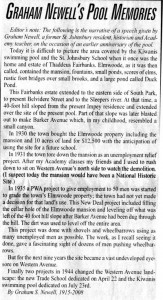We hear a lot these days about how the government should be working to “create” jobs for Americans. While those in government want people to believe that such jobs will be “good paying” (whatever that means) private sector jobs, the reality is that the government cannot actually create such jobs. Government can indirectly affect private sector jobs only be reducing taxes and regulations on all businesses. Any other methods, such as subsidies for select businesses, cannot increase overall employment as the taxes (or borrowing) used to pay the subsidies reduce potential employment in all other areas. In all probability, the number of jobs “created” will be less than those lost due to the general inefficiency of government spending.
The only ways the government can actually “create” jobs is to either expand the number of actual government employees or to create projects specifically designed to give jobs to the unemployed such as the PWA, Public Works Administration, during the Great Depression of the 1930s. Even such direct methods are unlikely to succeed.
Expanding government is unlikely to increase overall employment for much the same reason as noted above, though in this case the effect would be even worse. Not only would money needed to pay these new government employees be taken from the private sector via taxes or increased government borrowing, but expanding the size of government would also likely result in a higher level of regulation which also serves to decrease employment in the private sector.
 Work projects such as PWA also suffer from the negative impacts of the need for the government to pay for the program, but I want to set aside this issue to focus on what types of jobs might be created.
Work projects such as PWA also suffer from the negative impacts of the need for the government to pay for the program, but I want to set aside this issue to focus on what types of jobs might be created.
Recently in the Caledonian Record, our local paper, there was an article about the 70th anniversary of the Kiwanis Swimming Pool, the sole public swimming pool in the town, which contained a side-bar written by a town historian, Graham Newell, on the occasion of a previous anniversary celebration. In this article he describes the 1935 PWA project which leveled the area that was to become the swimming pool some years later.
In 1935 a PWA project to give employment to 50 men was started to grade the town’s Elmwoode property; the town had not yet made a decision for that land’s use. This New Deal project included filling the cellar hole of the Elmwoode mansion and leveling off what was left of the 40 foot hill slope after Barker Avenue had been dug through the hill. The dirt was used to level off the entire area.
Fifty unemployed men was likely a significant number for a small town like St. Johnsbury, but what exactly were these jobs? Keeping in mind that by the 1930s motorized equipment such as trucks and bulldozers were widely available, one might assume that these jobs were largely operating such equipment. Sadly, you would assume wrong, as Graham Newell goes on to describe.
This project was done with shovels and wheelbarrows using as many unemployed men as possible. The work, as I recall seeing it done, gave a fascinating sight of dozens of men pushing wheelbarrows. [ed. Emphasis is mine.]
Even ignoring the facts that paying for these jobs likely reduced employment in the private sector, and that even with these jobs unemployment remained high throughout the 1930s; we are left with the reality that when the government tries to “create” a significant number of jobs, they do so by doing tasks in as inefficient manner as they can get away with.
Lest one think that those in government do not think this way any longer, that it is a relic of the Depression, here is President Obama speaking in 2011 about “structural changes” in the economy that had contributed to the stagnant recovery.
When you go to a bank you use the ATM, you don’t go to a bank teller. Or you go to the airport and you use a kiosk instead of checking in at the gate.
In other words, if only we were more inefficient we would not have such high unemployment and economic stagnation, and everything would be much better for everyone.
If only we could not bank online which does away with even ATM maintenance men, buy books on Amazon which costs jobs at printers and local retailers, or watch HD movies streamed via the internet to your HD television which puts local movie theaters (not to mention companies that build theater equipment) out of business.
Yes, life would be so much better if we weren’t so damned efficient.
